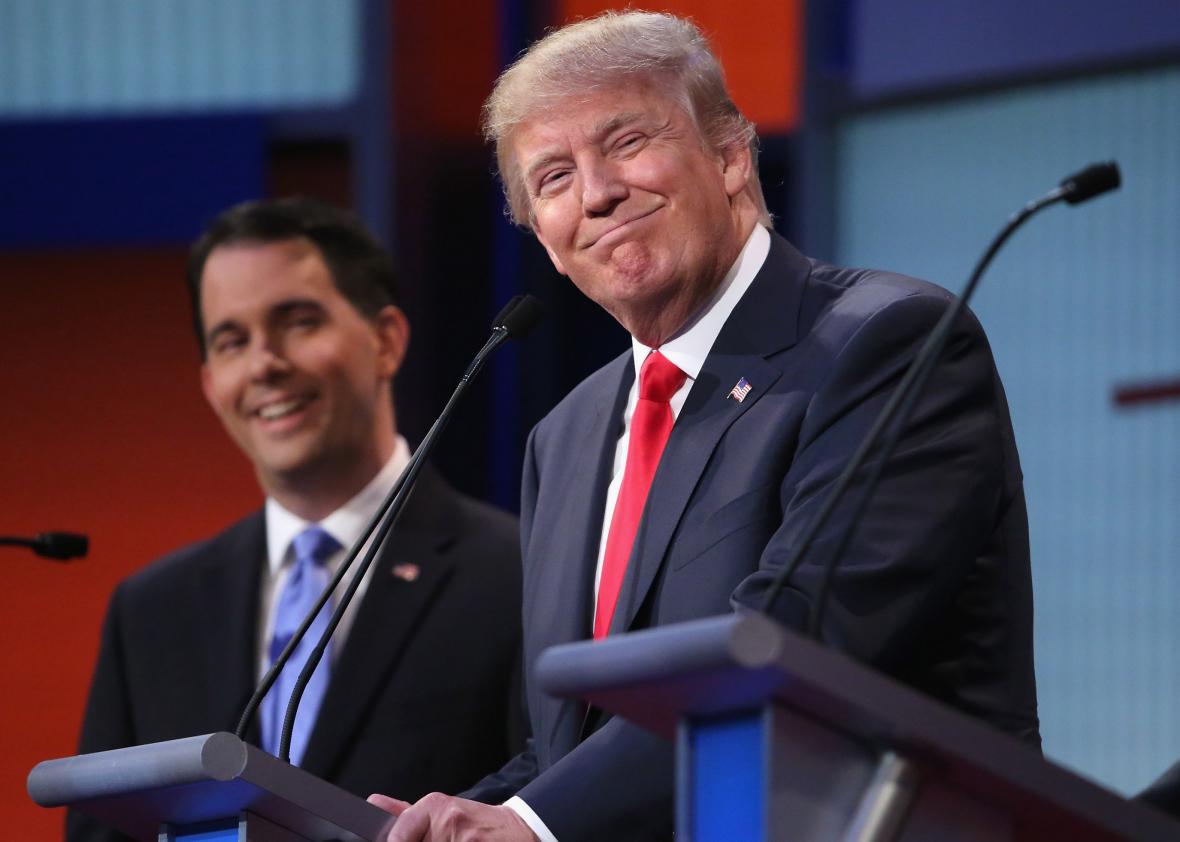In an interview published on Monday, Donald Trump offered up a trio of unexpected names for his vice presidential short-list, none of whom appear all that eager to join the celebrity billionaire on a Republican ticket: Scott Walker, John Kasich, and Marco Rubio. “There are people I like, but I don’t think they like me because I have hit them hard,” Trump told USA Today late last week.
While it’s possible to quibble with Trump’s belief about why those three men don’t like him, their true feelings are hardly in dispute. Walker waved a hard-to-miss anybody-but-Trump flag as he dropped out of the 2016 race last fall—back when the #NeverTrump movement was but a twinkle in Mitt Romney’s eye—and then backed Ted Cruz in his eventual blowout win over Trump in this month’s Wisconsin primary. Rubio spent the final weeks of his doomed campaign questioning the size of Trump’s, um, hands before being ultimately humiliated at the polls in his home state of Florida by the real estate tycoon. And Kasich, the only one of the three still in the race, has kept his undead campaign staggering forward on the very premise that Trump must be stopped at all costs. So when Walker said this week that he couldn’t “even fathom” being Trump’s No. 2, and Kasich similarly declared there was “zero chance” he’d accept a VP offer, it was easy to believe they meant it—and that countless other mainstream Republican feel similarly.
Still, a lot can change between now and the convention.
If Trump is the one standing on stage in Cleveland this summer when the balloons drop (a big if), and if the GOP establishment ultimately decides to rally around Trump in the event he is the nominee (a much smaller if), then an arranged marriage between Trump and a party-approved vice presidential nominee would be the GOP’s best—and perhaps only—chance to unify the party ahead of the general election. Trump’s match might not be any of the men he’s mentioned, but it would need to be someone with high enough standing within the party to have a chance at winning over enough anti-Trump Republicans to avoid a general election blowout and an accompanying down-ballot disaster.
That he will need a party-approved running mate is something the Donald already seems to realize. While this was the first time Trump floated specific names, he has been suggesting for months that he’d pick a running mate from within the same world of politics that he’s spent so much time railing against. Back in February, he said that he’d “probably choose somebody that’s somewhat political.” He went further the following month, telling New York magazine, “I don’t want to have two people [on the ticket] outside of politics.” And while Trump hasn’t exactly made friends with his fellow candidates on the campaign trail, he’s proved capable of forgiving (if not forgetting) when former rivals have been willing to go from lobbing insults at him to singing his praises. Simply put: The hurdle to a Trump-GOP unity ticket wouldn’t be Trump.
The question, of course, is why would someone like Walker, Kasich, Rubio, or any other bold-named establishment figure be willing to board the USS Trump given there is an electoral iceberg straight ahead? The answer to that is less obvious, though hardly unimaginable. Yes, running alongside Trump would come with very real risks, but the potential rewards would also be great.
The past two GOP vice presidential nominees, for instance, were both on a losing team in November, but they hardly suffered for it. Sarah Palin proved herself clueless on everything from advanced geopolitical relations to basic geography, and yet still became a political celebrity and fundraising powerhouse. The 2012 election turned Paul Ryan into a conservative poster boy, which helped get him elected speaker of the House last year and cast as a possible white knight this year. Trump is—obviously—no John McCain or Mitt Romney, but the veep slot is nothing to snicker at. While washing off Trump’s eau de toilette after any eventual loss wouldn’t be easy for his running mate, he or she would have amassed some serious chits from Republican power brokers, while also possibly earning themselves significant goodwill among Trump’s legions of fans. Keeping the necessary distance from Trump’s most outlandish positions (to protect his or her mainstream bona fides) while still staying close enough to Trump (to avoid alienating the candidate’s considerable contingent of fans) would be a tough line to walk, yes, but the mere joining of the ticket would go a long way towards pleasing both groups.
All of that might not be enough to convince a politician who still has presidential aspirations to play the role of loyal Republican soldier for the good of the party, but it will likely be enough for one with sights set a few notches lower, be it in the world of politics, business, or both.
That’s not to say that Trump will top a unity ticket this fall. There’s a very real chance that the Donald will arrive in Cleveland with the most delegates to his name and yet leave without the nomination. It’s also possible that Trump—needing a few dozen delegates ahead of the first roll call vote—could decide to offer the VP slot to someone who could deliver the unbound delegates he needs to win the nomination. Not to mention, given pretty much anything can happen at a contested convention, it’s even possible that the delegates will be the ones who picks the VP nominee regardless of who tops the ticket. But as difficult as it currently is to imagine Trump standing on stage with an old establishment foe this summer, it’s even more unimaginable that the establishment would prefer to see him up there with Sarah Palin, Ben Carson, or anyone else who might actually be eager for the job.
